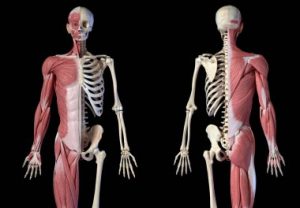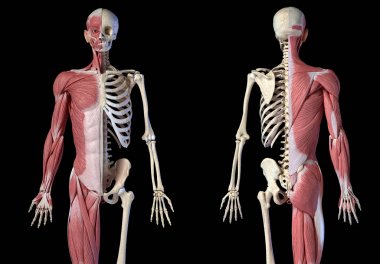The muscles, bones, joints, ligaments and soft tissues are the major parts that make up the body’s musculoskeletal system.
As we are growing older day by day, all the parts that make up our musculoskeletal system are going to start deteriorating, the muscle mass will experience sarcopenia.
Sarcopenia is the loss of muscular mass, which is replaced with stiff, fibrous tissue, bones will start losing its calcium, and the fluid which serves as a lubricant to the joint will start diminishing too.
This is the reason why we see so many old peoples that can’t walk or perform some movements they can perform in their younger days.
In order for it to work well, in order to maintain a healthy body, proper care and treatment are necessary. This article will cover helpful pieces of information on how to maintain this important part of the human body, even if you get old, you will still be a bit better than those who didn’t do any of the below-listed tips.
How To Keep Your Musculoskeletal System Healthy

Exercise
Aerobic exercise has many benefits, from maintaining heart health to increasing lung capacity to decreasing cholesterol and blood pressure.
From anaerobic exercise, it is also important to maintain bone density, improve muscle strength and endurance, and aid in the prevention of osteoporosis.
A good exercise routine will help you enjoy good general health, all while helping you maintain a healthy musculoskeletal system.
Strength or resistance training is also good for the musculoskeletal system.
Getting regular exercise causes you to bear weight or use resistance helps keep bones, joints and muscles healthy.
Proper diet
Excessive intake of saturated fat has been linked with high blood pressure in both men and women; moderate consumption has not been associated with this condition.
A diet that maintains a good amount of protein and calcium is important to prevent conditions such as osteoporosis and osteoarthritis.
Fiber, potassium, and water are also important for general health; a good diet maintains these conditions.
You should also eat foods rich in vitamin D, such as eggs, fatty fish, mushrooms, mackerel, salmon, and milk.
Get adequate rest and sleep
Most people don’t know that getting enough rest and sleep is crucial for maintaining a healthy musculoskeletal system.
You see, when we sleep, our bodies have the opportunity to repair and rebuild muscle tissue, which is essential for maintaining muscle strength and preventing injury.
Furthermore, sleep is important for regulating hormone levels, including those that are involved in bone health and muscle growth.
Thus, without adequate rest and sleep, our bodies may not be able to fully recover from physical activity, which can lead to muscle fatigue, weakness, and even injury.
Basically, lack of sleep can lead to increased inflammation and reduced pain tolerance, making it harder for muscles and joints to recover from daily wear and tear.
Hydration
Dehydration can have many negative effects on the body, including constipation.
Staying hydrated is essential for maintaining the health of muscles and joints. Water helps to lubricate joints, reducing friction and wear.
It also helps transport nutrients to cells and remove waste products. Dehydration can lead to muscle cramps and joint pain.
To add to that, it is important to maintain proper hydration so as to avoid the discomfort of this condition as well as the risks associated with other health problems like high blood pressure and diabetes.
Research in the American Journal of Clinical Nutrition indicates that even mild dehydration can impair physical performance and increase the risk of muscle cramps.
Thus, drinking plenty of water will aid in maintaining a healthy musculoskeletal system, while also preventing many other health conditions. Thus, you need to stay hydrated always.
Supportive factors
In the case of arthritic conditions, one must always take a supportive approach.
The body works as a whole, and is not just the sum of its parts; health should be maintained with proper supportive factors.
One must maintain adequate protein levels in addition to hydration and a proper diet in order to prevent disease.
Maintain good posture
Failure to maintain a good posture, over time, may result in long-term negative effects on the musculoskeletal system.
When you maintain a proper posture it will ensure that your spine is neither angled to either side of your body nor deviated along any of its natural curves.
Good posture also relieves muscle tension, and prevents joint pain.
In simple terms, maintaining a good posture helps to evenly distribute the weight across the musculoskeletal system, reducing strain on muscles and joints.
Poor posture can lead to muscle imbalances, back pain, and joint issues.
A study found that maintaining good posture can significantly reduce musculoskeletal pain and improve overall function.
Preventative treatment
Treatments for diseases such as arthritis or osteoporosis are important when it comes to maintaining a healthy musculoskeletal system.
A good doctor will be able to prescribe the proper treatment for conditions like this so that you can enjoy your life as it should be while also benefiting from improving general health.
Spend time outside
Spending time outside is not only good for the mind and soul, but it can also work wonders for the musculoskeletal system.
The fresh air and sunlight can help boost vitamin D levels, which is essential for strong bones.
Firstly, being outside encourages physical activity, whether it’s going for a walk, hiking, or playing a sport.
These activities can help build and maintain muscle strength, which is crucial for a healthy musculoskeletal system.
Furthermore, spending time outside can reduce stress levels, which can have a positive impact on overall health and well-being.
So, next time you have the opportunity to spend time outdoors, take advantage of it and give your musculoskeletal system a boost!
Conclusion
The musculoskeletal system is made up of the bones, muscles, tendons, ligaments and soft tissues. They all work together to support your body’s weight and help in movement.
You can avoid injuries, disease, pain, stiffness and other problems with movement and function by keeping your musculoskeletal system healthy.
In addition, avoid smoking, and reduce your consumption of alcohol. This is because smoking and heavy alcohol consumption can make your bones thinner.








